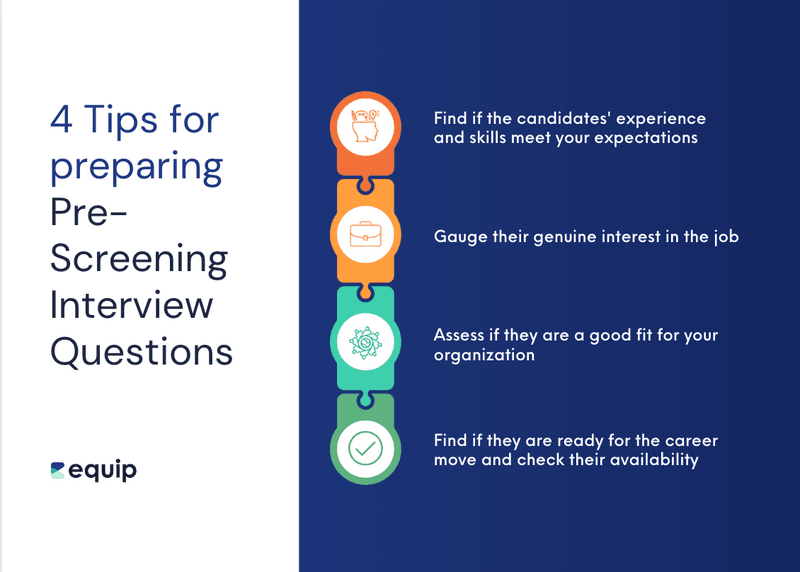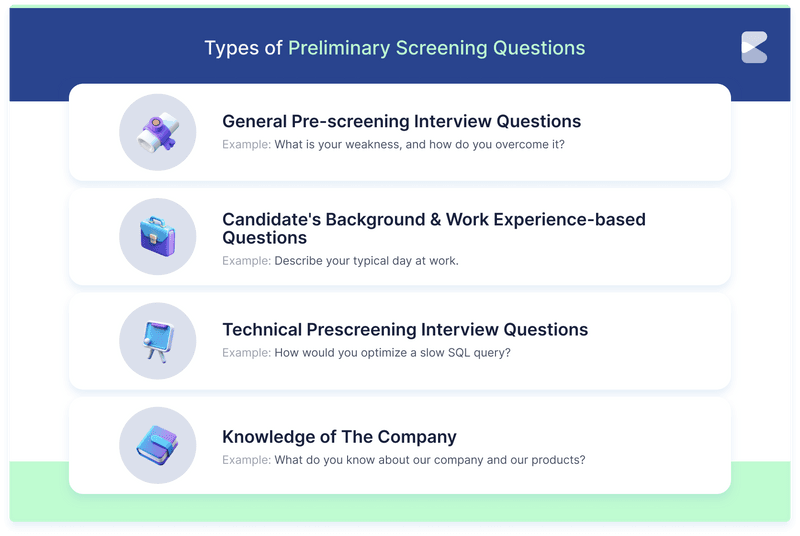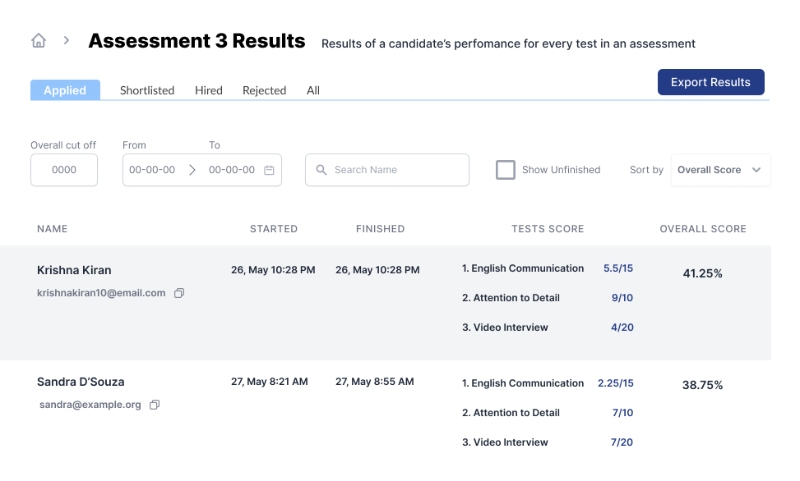
Asking questions is easy.
But in asking the relevant questions lies the real challenge, and no one knows this better than recruiters and hiring managers.
With the cost (per hire) of interview preparation, onboarding, and training of candidates increasing by the day, it has become necessary for talent acquisition personnel to adopt effective interview strategies and frame appropriate pre-screening interview questions to make a successful hire.
If you are a recruiter looking to frame the best pre-screening questions for candidates, check out this curated list of 38 preliminary screening interview questions that will make your task easier. This list will be equally helpful for candidates wondering how to prepare for a pre-employment screening interview.
Also read: How Recruiters Conduct Preliminary Screening While Hiring
What are preliminary screening interview questions?
Preliminary screening interview questions help recruiters to shortlist the applicants who meet the minimum eligibility criteria. Through a series of questions, recruiters also get to know the candidate’s personality traits, qualifications, and work experience.
Preliminary screening questions are designed to minimize turnover by restraining the mismatched and unqualified candidates from progressing to the next stage of the selection process.
They reduce the large applicant pool considerably and improve the quality of hire.
Tips for preparing pre-screening interview questions

Conventionally, recruiters use short questionnaires (with fewer than 10 questions) to know the applicant better. There are no ‘correct’ or ‘wrong’ questions to ask, and recruiters create their own list based on the information they need about the candidates.
Some recruiters prefer short telephonic pre-screening interviews, but recent research shows that video interviews are the most-favored form of interviews.
Read: How You Can Conduct Video Interviews on Equip
Whichever form you choose, here are the objectives of the questions you must include in the preliminary screening interview:
- Find if the candidates' experience and skills meet your expectations
- Gauge their genuine interest in the job
- Assess if they are a good fit for your organization
- Find if they are ready for the career move and check their availability
Types of questions for a pre-screening interview
There are broadly four categories of prescreening interview questions. These initial job screening questions are conducted by a recruiter or a Human Resources (HR) professional who expects clear and articulate responses from the candidates.

Important General Pre-screening Interview Questions
These are general questions concerning the job applicant’s personality, preferred work environment, career goals, expected salary, strengths and weaknesses, and cultural fit.
- Can you tell us about your background?
- Describe yourself in 3 words.
- What are your strengths?
- What is your weakness, and how do you overcome it?
- What would you like to be doing in 3 years?
- What are your professional goals for this year?
- Tell us about two of your most significant career achievements.
- How would you rate your achievements? Why?
- What leadership skills are your best and worst?
- When can you start working with us?
- What is your expected salary?
- What are the benefits that are particularly important to you?
- Why did you quit your previous job?
- What are your personal development goals?
- How do you prioritize your tasks to meet goals?
Candidate's Background And Work Experience - Based Questions
The following questions assess the candidate’s academic qualifications, motivation, leadership skills, and competency. They also gauge soft skills such as teamwork, dependability, problem-solving, and flexibility.
- Describe your typical day at work.
- What are your job responsibilities now?
- What motivates you to perform your best in your job?
- Describe your work style.
- How can you demonstrate that you have good interpersonal skills?
- What do you expect from this job?
- What did you dislike about your previous job?
- What frustrates you at work?
- What is your idea of a perfect work environment?
- Why are you quitting your current job?
- Are you a team player, or do you prefer working alone?
- How do you resolve your differences with a team member?
- Please provide professional references.
- What is your strongest knowledge area?
- What is a skill you are keen to master at the new job?
- Tell us about a crisis you averted at work.
- Are you comfortable working on projects with tight deadlines? Have you ever missed a deadline in your previous job(s)? What is your usual approach to handling such projects?
Technical Prescreening Interview Questions
Testing candidates’ technical prowess with technical prescreening interview questions is the most demanding job for recruiters and hiring officers. Not all have the technical knowledge, and many cannot code to save their lives (or careers).
Recruiters can easily handle preliminary screening HR questions and initial job screening questions. But when it comes to framing in-depth full-stack developer interview questions, MERN stack interview questions, or front-end and back-end developer interview questions, hiring managers are baffled no end. And they have to test the candidates at different skill levels too.
If this doesn’t keep them busy already, they must also draw up Customer Support Associate interview questions and Business Development Executive interview questions.
No wonder 41% of recruiters said assessing candidates during interviews was their biggest challenge. Still, they are not done yet!
They also have to design Digital Marketing interview questions with realistic scenarios for digital marketers to study the market, analyze options, run campaigns, research keywords, follow SEO rules and updates, and create content and copy.
Quite a chore, really!
Thankfully, there’s a platform that offers comprehensive skill tests suitable for technical, analytical, digital marketing, programming, and communication sectors. So check it out first, and thank us later for saving you time.
Knowledge of The Company
Job seekers apply to dozens of companies for jobs and attend scores of interviews. Though it is unrealistic to expect them to know the genesis and growth of all the organizations, recruiters expect interviewees to do their homework and come prepared with the essential details.
For example:
- What do you know about our company and our products?
- Have you used our products?
- Why do you want to work for our company?
- How easy will it be for you to adapt to our company’s culture?
- What is your opinion about a challenge we faced recently? (Modify by citing a specific challenge faced by the company)
- How do your goals align with the values and mission of our company?
Final Words
Interviewing candidates to test their skills and interpersonal abilities with preliminary screening questions is a complex process but an integral part of the Talent Acquisition procedure.
Equip helps you automate this process so that multiple candidates can be pre-screened quickly and easily.

The image above shows a dashboard of how the results would look. Schedule a free demo with our team to make your company's preliminary screening interview process seamless and effective.
Suggested for you: Why is Preliminary Screening Important While Hiring Candidates?
